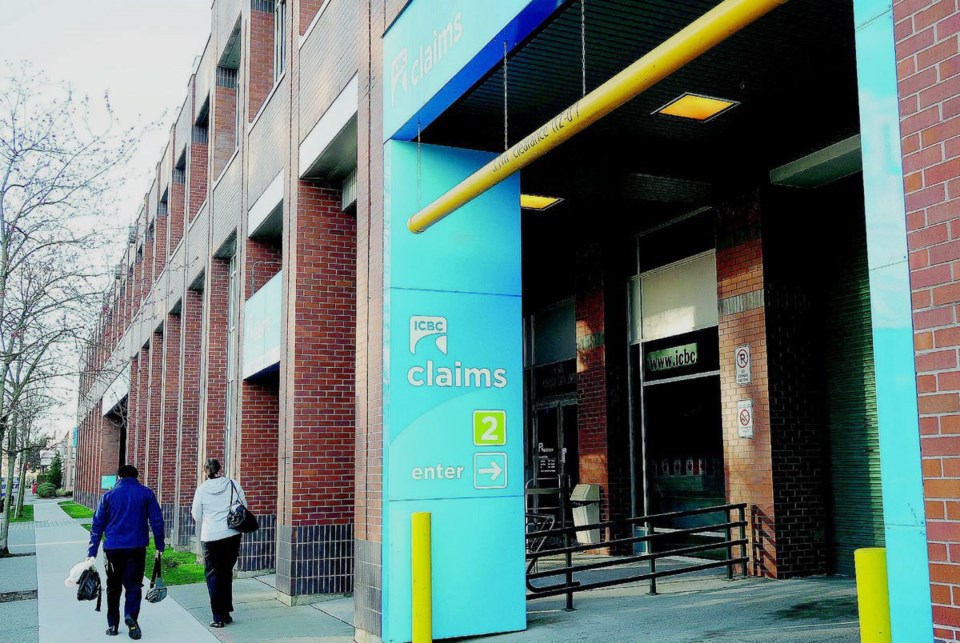Should bad drivers pay higher insurance premiums so that savings can be passed on to good drivers? What constitutes a good or bad driver, anyway? Those are some of the questions the provincial government wants answered as it considers an overhaul to the province’s auto insurance system.
For the next month, the public can weigh in on how the Insurance Corp. of B.C. should mete out rewards and punishment based on crash claims and driver experience.
Under the current system, a driver can cause one crash without seeing any impact on their insurance premiums if he or she has had no claims in the previous 13 years. That bar could be raised to 20 years of accident-free driving.
According to ICBC, 40 per cent of at-fault claims are forgiven each year because the driver has the maximum safe-driver discount.
After an at-fault crash, it would take drivers 10 years of accident-free driving to return to their safe-driver discount level rather than the current three years.
Right now, drivers have the option of repaying vehicle damage claims to avoid any impact on their premiums. The province is considering setting a dollar threshold for claims that can be repaid or eliminating that option.
The province wants to make it even more expensive for drivers with serious convictions such as drunk driving, distracted driving or excessive speeding by increasing driver penalty points and driver risk points by 20 per cent a year over two years. A driver with several serious convictions would see basic insurance premiums increase.
As of March 1, ICBC raised driver-risk premium penalties for drivers caught using electronic devices, putting this on par with impaired driving and excessive speeding.
A driver with two distracted driving tickets in a three-year period will pay almost $2,000 in financial penalties, an increase of $740. A driver with several minor driving convictions can expect an insurance hike under the proposed changes.
Minor driving convictions would include speeding, unsafe lane changes or seatbelt violations.
The new rules would also affect seniors and new drivers. The senior driver discount would be lowered after the first at-fault crash and removed after the second. New drivers who cause a crash would lose their discount.
Attorney General David Eby said a public engagement campaign, launched Monday, will help improve the auto insurance rating system for B.C. drivers.
“Drivers have been saying for years that the system would be more fair if low-risk drivers paid less for their vehicle insurance, while high-risk drivers paid more,” Eby said in a statement.
The province also wants to hold drivers accountable when they crash someone else’s car. The proposed changes would result in at-fault crashes being held against the driver, instead of against the registered owner of the vehicle they borrowed.
Vehicle owners would be asked to list all drivers who plan to operate the vehicle. If an unlisted driver crashes the vehicle, the registered owner’s premiums wouldn’t increase but they would have to pay a one-time fee for not listing that driver.
The fee would be more significant if the at-fault driver is someone who lives with the vehicle owner — for example, a family member.
ICBC is also considering giving a 10 per cent discount to drivers of cars with high-tech safety measures such as automatic emergency braking. A discount would also be available to drivers who clock less than 5,000 kilometres in a year.
The public can fill in a questionnaire about ICBC at engage.gov.bc.ca/ratefairness; it’s available until April 5 at 4 p.m.
Changes to insurance premiums are just one way the province is trying to dig ICBC out of a $1-billion hole.
In January, Eby described the situation at ICBC as a “financial dumpster fire” after the Crown corporation posted a net loss of $935 million in the first nine months of its fiscal year and a projected a $1.3-billion loss by the end of the fiscal year. He warned that drivers could face premium increases of about $400 or more if no action was taken.
Last month, Eby announced that ICBC will put a $5,500 cap on pain and suffering payouts for people who suffer minor injuries in a crash. In an effort to reduce legal costs, disputes about what constitutes a minor injury will be moved out of the court system and directed to an independent dispute resolution process.
The changes take effect in April 2019.



